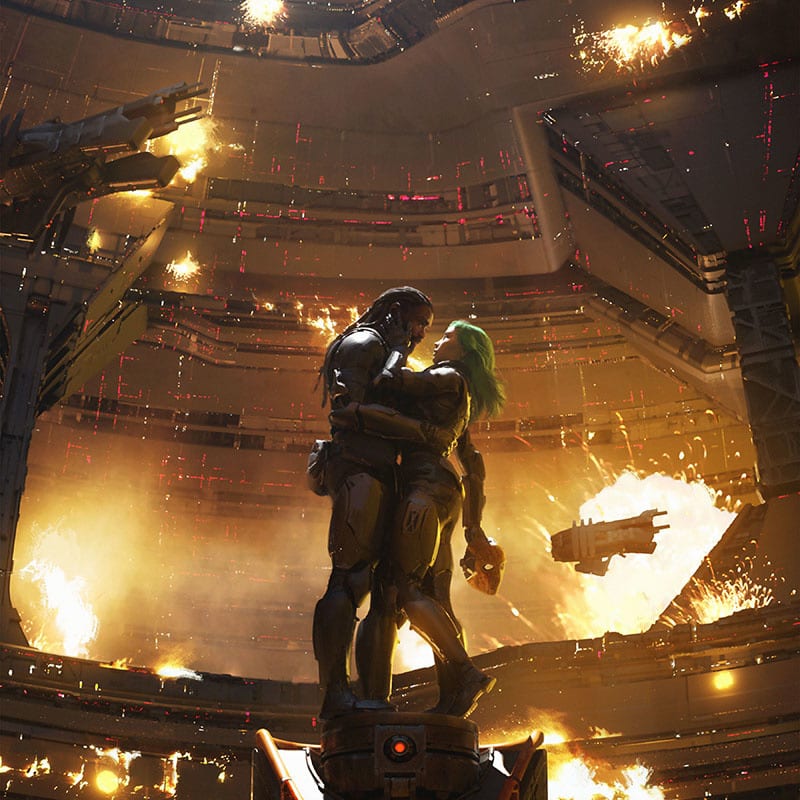
Last time around, Coheed and Cambria took a break from the sci-fi world inhabited by their other seven albums to just make a record full of songs. Even without a conceptual story, The Color Before the Sun featured a lot of the same musical elements that have made the long-running prog-rock band so enduring: big riffs, bigger choruses, intricate guitar interplay, and strong vocals from frontman-songwriter-guitarist Claudio Sanchez. But it also found the band attempting to stretch a bit, with mixed results. The short, quiet, voice and acoustic guitar ballad “Ghost” worked beautifully, while the hippie-folk closer “Peace to the Mountain” dragged through its six and a half minutes, and trumpets and strings couldn’t disguise how repetitive the song was.
With that palate cleanser album in the rearview, The Unheavenly Creatures finds the band back to the Keywork, with its 78 interconnected planets and Sanchez’s epic storytelling. How much of that storytelling comes through in the actual songs is always something of a crapshoot with Coheed and Cambria. Sanchez has often described the albums as soundtracks to accompany the story rather than full rock operas. This sense of mystery has allowed Sanchez and his wife Chondra Echert to produce an ongoing comic book series based on the story aspect of the band’s first few albums and also why their more recent conceptual releases (including this one) have been available in deluxe editions that come packed with a novel or illustrated novella laying out the actual story for the hardcore fans.
The Unheavenly Creatures picks up sometime in the aftermath of the events of the 2007 album No World for Tomorrow, which finished out the band’s original Amory Wars storyline (the stories on their three subsequent albums were all prequels). This is the first of a new planned five-album cycle called Vaxis, and it begins, as many of the band’s albums do, with a quiet “Prologue”. A simple, catchy little piano melody plays for the first 45 seconds, before a low, pitch-shifted voiceover sets the scene. Ominous, John Carpenter-style synths accompany this voice as he talks about “the five houses of the Star Supremacy”, “planetary prison pits”, and “a romance between a pair of unheavenly creatures”. The voiceover concludes, “It begins with them, but ends with me, their son, Vaxis.”
If you’re a listener here for the details, this stuff is red meat. Sanchez is giving glimpses of where things sit in his universe at the start of the story and hints that his previous set of heroes didn’t actually bring down their galactic oppressors. But if you’re a listener who’s just here for the riffs, it’s pretty easy to ignore the voiceover and just dig the synths as they push directly into the album’s typically epic opener “The Dark Sentencer”. This song has big, heavy guitar riffs, a recurring “Hey! Hey! Hey! Hey!” shouted backing vocal, and Sanchez’s vocals go from a snarl to his trademark soaring high tenor singing. Musically, this is right in the band’s wheelhouse. Their albums are full of long, epic, hard-rocking openers, and “The Dark Sentencer” follows the template exactly. But it doesn’t move me as much as I’d expect.
This is interesting, because it turns out that The Unheavenly Creatures pulls back from the mild sonic experimentation of The Color Before the Sun and drills down into exactly what makes Coheed and Cambria work best as a band. For the most part, this is wildly successful, and this album may be my favorite of theirs since the one-two punch of In Keeping Secrets and Good Apollo back in 2003 and 2005. But in embracing their core sound so fully the band straddles a line between “this is what we do best” and “this song is a bit too familiar-sounding”. Most of the time they end up on the correct side of that line, but there are a couple of tracks here that elicit more of a shrug than the expected fist-pumping and singing along. “The Dark Sentencer” is one of these. It’s fine, but on album #9 it may be asking a bit much of Sanchez to follow the same template and live up to the trio of openers that so memorably opened albums two (“In Keeping Secrets of the Silent Earth”), three (“Welcome Home”), and four (“No World for Tomorrow”).
The catchy “The Unheavenly Creatures” comes next, describing the titular romance as well as a harrowing escape on top of a bed of catchy pop-metal. The opening riff of the song is a tinny, 1980s video game style synth figure, but it ends up being more of a garnish that pops up occasionally between the blazing rhythm guitar chords and ear-grabbing chorus “Run run run run run / Like a son of a gun.” At just over four minutes, this is one of the album’s shortest songs, and the next two tracks demonstrate the advantage of Coheed and Cambria taking a little more time to stretch out across the album.
“Toys” also features a big, catchy, triumphant guitar riff. It’s a really good riff and a throwback to 1970s arena rock and 1980s hair metal. It’s a mid-tempo song that rolls along on its big guitars and big vocals, an unapologetically bright rocker. After four and half minutes, “Toys” runs out of lyrics, but by stretching for an extra two minutes, the band makes time for a strong guitar solo and a coda that allows one more full run-through of the entire extended chorus sequence, to great effect. “Black Sunday”, on the other hand, begins all heavy and dark. It’s one of the album’s darkest musical sections. It’s not particularly fun, but the song contrasts nicely with “Toys”, and guitarists Sanchez and Travis Stever as well as drummer Josh Eppard really pound away effectively together while bassist Zach Cooper steadily keeps the song steady. But after three minutes, the song hits a bridge where the rhythm mostly stops and backing vocals repeat “Black Sunday”. Coming out of this bridge, the song pushes into a lighter, cathartic finish. Intentionally or not, this is a song that echoes the knotty, oddball song construction on the band’s first album, where a track would often twist and turn for a good three or four minutes before getting to anything resembling a catchy chorus.

Smack in the middle of the album are three songs that show off three sides of the band, to varying effect. “Queen of the Dark” is slow, heavy, and ominous. Eppard’s drums sound huge, while Sanchez’s vocals are dripping with emotion. The band relies on the heavy sound and the vocals to sell the song, and it almost works. But the refrain, where Sanchez moaningly sings “Queen of the dark”, is not a great one. And that simple refrain takes up a huge chunk of the six-minute song’s final two minutes, rendering it more repetitive than compelling. “True Ugly”, on the other hand, is a fast rocker. It bristles with punk energy and is driven by Eppard’s hard snare hits on every single beat. There isn’t a lot to the track from a songwriting standpoint, but it works because it’s the only song on the album that just blazes straight through. Then there’s “Love Protocol”, which, despite a tensely picked staccato guitar riff in the verses bursts into a big, catchy, sing along chorus, which pushes into an even bigger, soaring post-chorus. This is a song that’s all about the melody, even on the piano-based bridge.
Interestingly, the band saves some of its most interesting song ideas and catchiest melodies for the back half of this 78-minute monster of an album. “The Pavilion (A Long Way Back)” is one of the record’s highlights, with a simple repeating arpeggiated guitar riff and a cool syncopated drumbeat from Eppard underpinning a passionate vocal performance and slow, crunchy chords in the other guitar. This is a big, anthemic song that swells and ebbs in all the right places and even finds a place for subtle, effective violins in the background. “Night-Time Walkers” brings in more Carpenter-style 1980s synths to set its mood, but the crunching guitars and powerful drumming from Eppard are all Coheed. That mood only lasts for about a minute before the song pushes into another soaring, anthemic chorus. In this instance, though, the band pulls it right back down to the synth-driven verse, giving the track a great sense of tension and release. Then, shortly past the halfway point, Sanchez sings a tender, if odd, turn of phrase. “She’s sailing safely inside my head / We lay in the comforts of our own bed / It’ll be alright, it’ll be alright (we’re playing dead).” For the curious, I’m sure there is some heavy-duty story stuff going on here, but for the song itself, it’s a great little twist that resets the track in a great way.
The Unheavenly Creatures‘ climax comes on “Old Flames”, its second-to-last track. Opening with a pretty piano figure, the song slides into some gauzy, wordless “ahhs” from Sanchez before the drums and guitars kick into a major key chord progression. We’re in bright, positive rock territory here (think Cheap Trick, Van Halen) and it’s a great closer that leaves the listener (well, this listener, at least), with a big grin. Even as Sanchez sings “We all go up in flames / Go out in style” over and over, the music stays relentlessly upbeat. And that’s even before the song finishes out with a full minute of the band just singing the melody on “Naa / Na na na na na-ah.” And then there’s the kicker. As the guitars and drums fade and the melody resurfaces on the piano, it turns out that “Old Flames” uses the same motif as the album’s prologue.
“Lucky Stars” closes out the record as a postscript of sorts, a largely acoustic track that didn’t fit elsewhere on the album. It’s a fine, tender ballad, with nice use of background violins and an eventual full band expansion that retains the tenderness even as the volume increases. As a quiet comedown from the bombast of the previous 73 minutes, it’s a fine exit from the most complete album Coheed and Cambria have put together in a long time.


![Call for Papers: All Things Reconsidered [MUSIC] May-August 2024](https://www.popmatters.com/wp-content/uploads/2024/04/all-things-reconsidered-call-music-may-2024-720x380.jpg)



